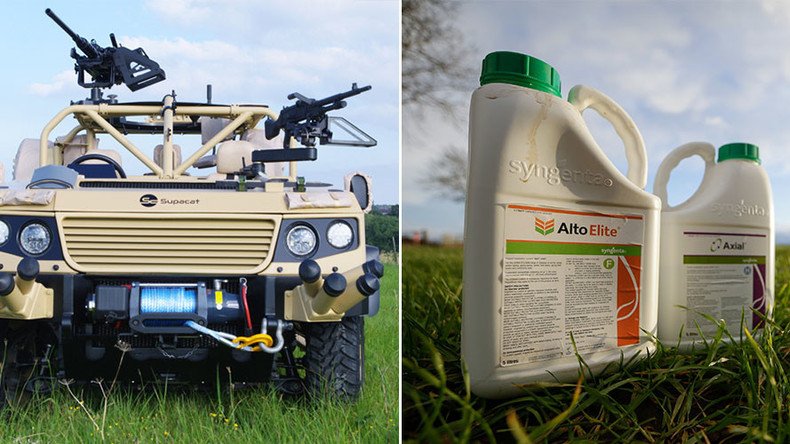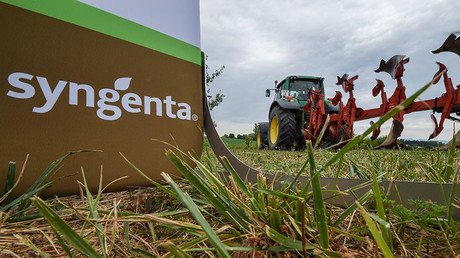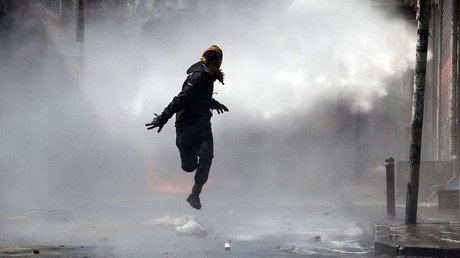This Unethical Isle: 5 terrible things Britain exports to the world

From leaded petrol that causes brain damage, to weapons used in the war on Yemen and weed killer linked to Parkinson’s disease, Britain is openly exporting unethical goods and services to some of the world’s poorest and most abusive nations.
RT UK takes a look at some of Britain’s most questionable wares.
Leaded petrol
A British company is selling lead fuel additives - banned because of their “catastrophic” effects on human health - to one of the last remaining countries in the world where it is still legal, Greenpeace has revealed.
The Cheshire-based firm Innospec Ltd still sells tetraethyl lead, or TEL, to Algeria, despite the UK banning it in 1999. Innospec itself pledged to stop exporting the chemical by the end of 2012, then the end of 2013, then 2014.
Our scoop in The Independent: UK company is selling lead fuel additive which has catastrophic effects on health https://t.co/JY4yo9EmOwpic.twitter.com/2EtTlZTbzY
— Greenpeace UK (@GreenpeaceUK) August 23, 2017
Only Iraq, Yemen and Algeria still use TEL, according to the United Nations Environment Program.
The chemical has been linked to severe health problems, including premature death and brain damage, as well as kidney problems and abdominal pain.
Recent studies have also linked TEL to violent crime. According to US research, the chemical can harm parts of the brain linked to impulse control and can cause violent behavior.
Company accounts show Innospec sold $30.9 million worth of TEL in the first six months of 2017, making a profit of $16.2 million.
Weapons to Saudi
In the last two years, the UK has licensed the sale of £3 billion (US$3.86 billion) worth of arms to the Saudi government, with which Britain is a longstanding ally.
Arms sales have included Typhoon and Tornado jets and the UK has had military personnel embedded in Saudi headquarters throughout the Yemen conflict, which has raged since 2014.
The British government’s weapons sales to the Saudis have come under sustained scrutiny from campaigners since the start of the campaign in Yemen, where the Saudi-led bombing campaign is accused of killing civilians and damaging vital infrastructure.
The United Nations estimates around 2.5 million people have been displaced during the conflict, and 17,000 people have died.
Saudi Arabia remains the UK’s most important weapons client.
Toxic weed killer
Thousands of tonnes of highly-toxic weed killer not authorized for use in the EU are being produced in Britain and exported to the developing world, it has been revealed.
Paraquat, a pesticide that can be lethal with a single sip, has caused thousands of accidental deaths and suicides globally, and was outlawed by EU states in 2007. It can be absorbed through the skin and has been linked to Parkinson’s disease.
Swiss pesticide manufacturer Syngenta is exporting thousands of tonnes of the substance to other parts of the world from an industrial plant in Huddersfield, northern England.
Syngenta is responsible for 95 percent of Europe’s exports of paraquat, which it sells under the brand name Gramoxone. It has exported 122,831 tonnes of paraquat from the UK since 2015, an average of 41,000 tonnes a year, according to export licensing data analyzed by the Swiss NGO Public Eye.
Riot control training
The UK government has been accused of “arming repression” in countries such as the UAE, Saudi Arabia and Oman, after nearly £46 million worth of British export licenses for crowd control items were issued to Gulf states.
According to a report by anti-poverty and human rights charity War on Want, Britain has been training snipers and public order forces, and selling tear gas and surveillance technology to countries widely criticized for human rights abuses.
Since 2010, an estimated 6,000 individual export licenses for all types of arms and defense technology were issued to governments in the Gulf region. The British government’s earnings from the deals added up to £16 billion.
Of those approved, 120 licenses – with a total price tag of £45.6 million – specified the sale of crowd-control devices, often used to suppress dissent during democracy protests.
War on Want researchers found licenses for items such as water cannon, CS grenades and appliances that can emit extremely aggressive sounds in order to disperse crowds.
Britain’s largest arms client, Saudi Arabia, purchased £1.7 million worth of materials used in quashing dissent in December 2012.
Immigrants
According to UN figures, around 1.2 million Brits live elsewhere in the EU, with many located in France, Spain and Ireland. Up to 4 million Brits live in other parts of the world.
Brits are not always perceived fondly by the international community, however.
Expats are seen buying up posh property in the south of France and Spain, pricing out locals, and often refusing to learn the language.
Tourists are known for boozy getaways in Magaluf and Ibiza, with locals staging anti-tourist protests in popular European destinations this summer.
Last year, the British Council put out a report titled “As Others See Us.” It wasn’t all nice. Respondents outlined the most negative things they could think of about Brits, including “Drink too much alcohol,” “Bad eating habits,” “Rude,” and “Complain too much.”














